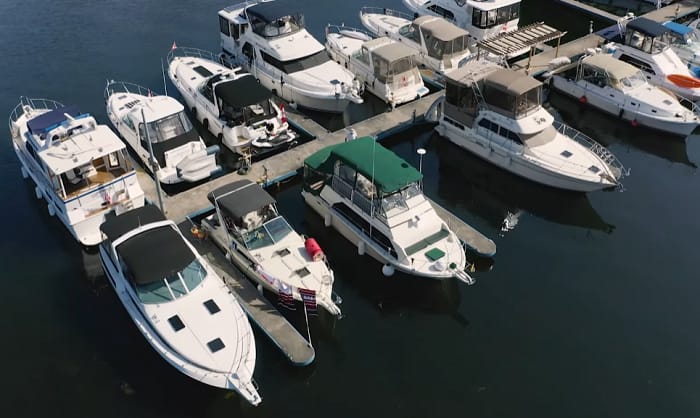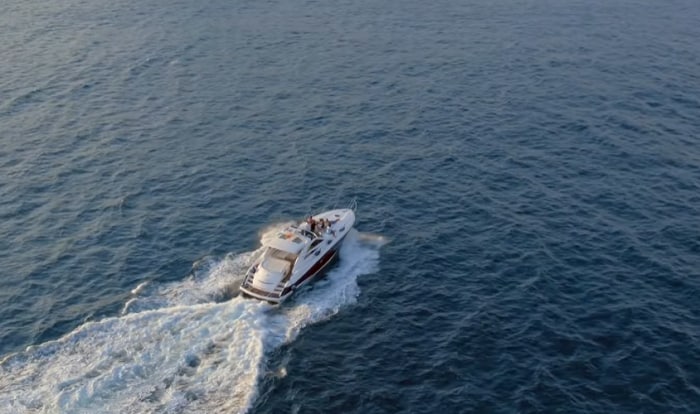Many long-time boat owners consider buying a used boat to be financially sound advice. Numerous first-hand stories narrate money savings of a not-so-lowly 8% to a head-turning 20%.
Don’t be surprised if the same boat owners push you to learn how to buy a used boat from a private seller. “Wait a year or two when they flood the market,” they’d probably add.
Having bought my boat this way, I can’t agree more. Once the time comes, you have to be ready to seize that killer deal. I’ve prepared this used boat buying guide to make the process smooth.
Table of Contents
How I Smoothly Bought a Used Boat From a Private Seller
These are the steps and tips that I followed when I bought my cabin cruiser.
1. Plan your budget and negotiate the price.
Assuming you haven’t narrowed down on a specific price yet, do that as a first step. I’m going to assume that you’re looking at boats for sale by private owners since you don’t want to deal with an overpriced market.
There’s no equaling the feeling of saving on used boats while getting maximum value for money. Here are the common factors that greatly affect the price:
- Brand
- Vessel’s size
- Make model year
- Engine make model year and hours of use
- Motor’s type (e.g. inboard/outboard, outboard, or inboard)
Once you’ve got a specific figure in mind, you can now start negotiating with the private seller. The seller may ask for a deposit as well to build trust, so consider that route.
2. Personally inspect the boat and request/do a trial run.
Never buy a boat unseen. If the seller is not allowing you to do a personal inspection, that’s a major red flag! Be sure you’re comfortable with the boat as you sail it for your specific purposes.
Remember: you can always back out of a deal if you’re not satisfied with driving the boat. If you’re still having doubts about this, take a couple of minutes to watch this brief, informative video:
Of course, trying out the boat at sea or lake means you’ll have to be willing to drive to the seller’s location. It’s worth it once you think about it since even if you’re saving a few thousand or hundreds of bucks on the used vessel, you’ll still be shelling out a substantial amount.
- Talk to the seller. Ask how he or she cared for the boat and their sailing habits if you can and get a feel of their personality.
- If possible, invite a marine surveyor to come with you on the trial run. Incidentally, this takes us to the next important point as follows.
3. Hire a marine surveyor or mechanic to inspect the vessel.
While this is arguably an optional step, I suggest you do it in order to make sure you’re paying your money’s worth.
The seller should be willing to adjust the price after the inspection, especially if there are significant issues.
Either meet with the surveyor as he or she performs the inspection or just request them to call you once it’s done. I took this advice to heart, and even after 5 years of continuous use, I’m still in love with my cabin cruiser’s performance.
Here’s another nifty tip: If you’re still weighing your options, ask the surveyor about the best local deals. Chances are, they’re well aware of a private owner or two who wants to sell his or her vessel directly!
4. Don’t forget to request a bill of sale.
If the seller doesn’t automatically provide it, you have to ask for an agreement for the sale and purchase (aka bill of sale). It provides legal protection to both parties and is often necessary when you’re not purchasing from an official dealer or buying a boat out of state and must travel for miles.
- The sale agreement protects you from the possibility of the seller selling the boat out from under you. You’ll find this especially useful if you’re already paying for the used boat inspection.
- Having the bill of sale may also help if you don’t have a temporary or permanent plate on your boat yet after you’ve bought it and are taking it home.
I have a friend who was stopped by a cop for this. He only showed the bill of sale and explained that he was transferring the boat home, and the cop was cool with it. I repeat, though: this isn’t a sure-fire thing!
- If the seller asks to be paid via PayPal, that should raise your eyebrows. You’ll run the risk of having zero buyer protection if you decide to go that route.
5. Complete the transaction.
With every checkbox ticked, you can now complete the transaction.
You might be wondering, “Is there a way for me to get a temporary or permanent plate for my boat quickly?” Yes, if you’re fine with traveling to the DMV office to complete the transaction.
Here’s how I did it: the seller and I agreed to complete the transaction at the local DMV office. I got a temporary plate immediately and received the permanent one two weeks later. Take note that this was 5 years ago, though, but I’m fairly confident that the SOP hasn’t changed that much.
Other Scenarios to Consider
When purchasing a used boat, not everyone is in the same, well… boat. You may need, as I said above, to buy the vessel out of state or want to do it without a broker and surveyor who will only balloon your expenses further. I suggest you remember these guidelines and things to look for.
Things to consider when you’re buying out of state:
- Look at the tax regulations of the state you’ll be registering the boat in and where you’ll be buying it from. Google’s your best friend when it comes to this. Read up on each state’s tax codes on their official websites.
- You may forgo paying a sales tax since private sales are generally not taxable. Still, you’ll have to confirm this in your home state’s regulations. In most cases, you need to pay the state where you register your boat.
- There may be other requirements and considerations (e.g. the boat’s size and other tax liabilities), so be sure to read up on the respective sites of the states involved.
What to keep in mind when buying without a broker and surveyor:
- While Craigslist is a gold mine for direct sellers, the best way to navigate its unpredictable waters is to acquire, at least, some fundamental sailing and boat maintenance knowledge skills. Trust me: you’ll be able to quickly separate the wheat from the chaff this way.
- The video I shared above covers a few basics on boat surveying, so be sure to keep its tips in mind. The key is to actually learn how to survey a vessel yourself, which takes some time and dedication.
Conclusion
Done! Let’s rewind and summarize this checklist:
- Pinpoint your exact budget threshold and always be open to negotiation.
- Settle for no less than a personal and professional done by both a mechanic and marine surveyor.
- Do a trial drive afterward.
- Finish the purchase and ask for a bill of sale.
How did you find my guide on how to buy a used boat from a private seller? Please share your thoughts below and spread the information to other people who may find it useful.

“My intention from the first day establishing Boating Basics Online is to provide as much help as possible for boaters who want to experience a first safe and convenient trip. So feel free to join us and share your beautiful journeys to the sea!”



